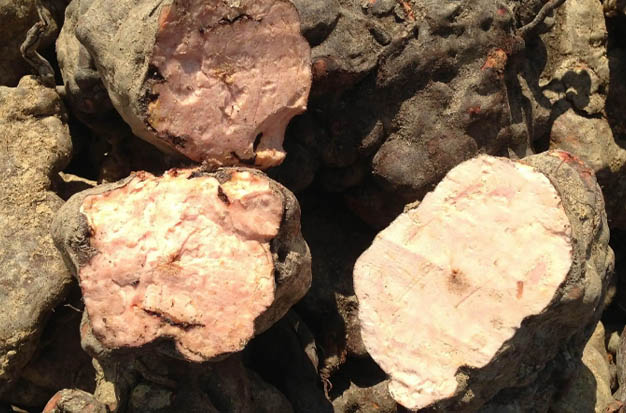He Shou Wu (Fo-Ti) is used in herbal products and in the treatment of various health diseases all over the world, and has a certain positive effect on hair health treatment. Is there really a significant change before and after the use of He Shou Wu (Fo-Ti)? He Shou Wu (Fo-Ti), named for its anti-aging effect, is traditionally used to treat diseases that worsen with age, including hair loss and hair whitening. Studies have shown that He Shou Wu (Fo-Ti) can help support healthy hair growth by inducing the growth period (or growth period) of stationary hair follicles and encouraging hair root cells to reproduce faster. These preliminary studies show that He Shou Wu (Fo-Ti) has great potential to promote hair growth, although many medical professionals believe that there is not enough data to support the use of fo Ti as a medical means.
With more research on the possible risks of He Shou Wu (Fo-Ti), it is obvious that more research is needed. In order to ensure patient safety, research must explore Chinese herbal medicines and their possible interactions with prescription drugs as well as possible side effects.
What is He Shou Wu (Fo-Ti)?
He Shou Wu (Fo-Ti) is a Chinese herbal medicine extracted from Polygonum multiflorum Thunb.
It is also called Zoysia japonica in China and futi in the United States. This popular herb is used worldwide to promote health and masculinity, and to treat a variety of health conditions. He Shou Wu (Fo-Ti) is a kind of vine. After harvest, leaves, roots and tubers are separated and combined with other ingredients to create drugs for different diseases.
He Shou Wu (Fo-Ti) is one of the sacred roots. It has been recorded in a large number of documents since ancient times and is respected by the modern scientific community. He Shou Wu (Fo-Ti) is a popular traditional Chinese medicine. Studies have shown that this herb is beneficial in the treatment of cancer, diabetes, hair loss, arteriosclerosis and neurodegenerative diseases. It is commonly known as he Shou Wu in China and fo Ti in North America. Traditionally, it is also regarded as a kind of spiritual herb, which is called the herb to enhance spiritual power among monks and therapists.
How Does He Shou Wu (Fo-Ti) Benefit Hair Health?
He Shou Wu (Fo-Ti) is a wild Oriental rose plant with rich nutrition. It has been used to study the medicinal quality of plant roots for a long time. He Shou Wu has been used in traditional Chinese medicine for hundreds of years because of its anti-aging and longevity characteristics. He Shou Wu (Fo-Ti) has the potential to increase the level of superoxide dismutase (SOD) in vivo, helping to protect cells from lipid peroxidation and DNA damage. By increasing the level of SOD, Heshouwu can prolong the life span at the cell level. This in turn has many benefits for the body, of which the most common he Shou Wu is the effect on the hair.
By nourishing the liver and kidneys, He Shou Wu (Fo-Ti) stimulates the blood circulation of the scalp, thus making the hair healthier. He Shou Wu provides this by promoting melanin production and nourishing hair follicles. The reduction of melanin is the main cause of hair whitening. He Shou Wu can promote the generation of melanin, make the hair gray, but darken, and restore the natural color.
Studies have shown that He Shou Wu (Fo-Ti) not only has strong hair effect, but also has the ability to reduce cholesterol, partly due to the content of lecithin in herbal medicine. Shouwu helps to promote proper erythropoiesis, slow down gland degeneration and increase antioxidant activity in the body, all of which help to slow down the aging process.
It is very important to find the correct form and effect of he Shou Wu. In order to see the correct results, the extracted form is essential. The concentration of the extract can be 10 times, 20 times or even 100 times that of the powder. For example, if a 500mg tablet of he Shou Wu powder is compared with a 500mg tablet of he Shou Wu 12:1 extract, the results show that 12 500mg tablets of Shouwu powder are equivalent to a 500mg tablet of 12:1 extract. Nature elements provides customers with the purest and most effective he Shou Wu in a ratio of 12:1. Ironically, the price of powder is often high. Although the extract makes the cost of vitamin companies higher, the cost of consumers may not be higher. This 12:1 extraction ratio is included in the formula of natural element he Shou Wu and advanced he Shou Wu. Some competitors selling Shouwu usually sell products with low efficacy, requiring 3 or more doses per day, up to 3 tablets. There are 9 pieces in total. Due to the concentration of natural elements, consumers only need to take 2 tablets every day.
What is He Shou Wu (Fo-Ti) Used for?
He Shou Wu (Fo-Ti) is a versatile traditional Chinese medicine. Many people take it to improve their health, especially in old age. However, this herb can also be used to treat various health conditions, such as diabetes, hair loss, heart disease, constipation and cancer.
1. Anti inflammatory: TSG and mood in fo Ti have been studied to reduce inflammation. Emodin protects microglia in the brain from lipopolysaccharide induced inflammation by activating ampk/nrf2.
2. Promote immune function: the sugars (rhamnose, arabinose, xylose and glucose) and anthraquinone glycosides in He Shou Wu (Fo-Ti) can improve immune response and overall immune system function (immune regulation). He Shou Wu (Fo-Ti) enhances the immune system by increasing the production of T cells and B cells, increasing the activity of immune cells and increasing the secretion of inflammatory tumor necrosis factor. In addition, He Shou Wu (Fo-Ti) can increase the activity of natural killer (NK) cells.
3. Antiviral: in a cell-based study, fo Ti showed anti HIV by preventing the virus from entering lymphocytes.
4. Protect the liver: Anthraquinone and polysaccharides in fo Ti protect the liver by reducing inflammation, preventing fat oxidation and enhancing antioxidation.
5. Protection of bones from oxidative stress: in a cell-based study, TSG from He Shou Wu (Fo-Ti) extract protected osteoblasts (osteoblasts) from oxidative damage, suggesting that TSG may prevent osteoporosis caused by oxidative stress.
6. Protection of tissue oxygenation in patients with diabetes: 2,3,5,4 ‘- tetrahydroxystilbene-2-o- β- D-glucoside protects diabetes mice from kidney damage caused by hyperglycemia through SIRT1 and TGF-beta1 pathways.
7. Neuroprotective effect: studies have shown that He Shou Wu (Fo-Ti) may be helpful in the treatment of Alzheimer’s disease. Tetrahydroxystilbene glucoside in fo Ti helps to improve memory impairment. A small clinical trial in China found that the extract of Radix Fortis was effective for Alzheimer’s disease. Tetrahydroxystilbene glycosides can alleviate age-related memory loss in rats. In a cell-based study, treatment with Radix Fortis extract reduced amyloid plaques that can lead to Alzheimer’s disease.
Correct treatment of He Shou Wu (Fo-Ti) can greatly reduce its impact on the gastrointestinal tract, especially on the liver. Traditional processing involves a kind of decoction, whose chemical composition has changed significantly, which will inevitably affect the relevant pharmacological properties of HSW. Its biological form is known to cause nausea and diarrhea. In fact, it is used in traditional Chinese medicine for specific functions such as detoxification, carbuncle elimination, malaria and intestinal relaxation, while the decoction is used to tonify the kidney and liver, supplement blood essence, black hair, strengthen bone and muscle, remove dampness and reduce blood lipids.
Is He Shou Wu (Fo-Ti) Valid?
Laboratory tests showed that Polygonum multiflorum Thunb and its compounds had biological activities. This shows that it can provide many health benefits. In fact, he Shouwu has been proved to have anti-inflammatory, hypoglycemic, antibacterial and anti-tumor effects in vitro. Biological compounds found in He Shou Wu (Fo-Ti) may also have a positive effect on blood cholesterol levels and improve conditions caused by age-related neurological decline, such as Alzheimer’s disease (Alzheimer’s disease). However, in vitro studies do not tell us whether these compounds are effective in humans. Human studies are limited and often of poor quality. This means that most of the evidence for He Shou Wu (Fo-Ti) comes from anecdotes. At present, it is impossible to reliably know whether Polygonum multiflorum Thunb can effectively treat the diseases it claims to be helpful for treatment.


